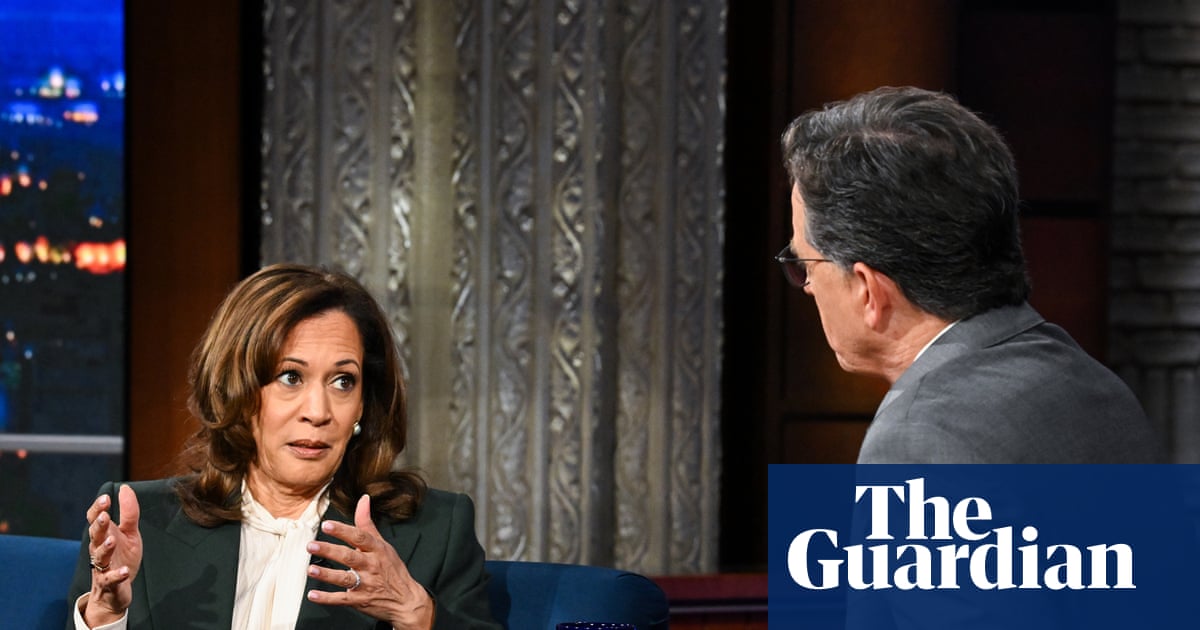Kamala Harris: Reflecting on a Broken Political System
In a recent interview with Stephen Colbert on The Late Show, Kamala Harris expressed a deep disillusionment with the American political landscape, declaring that she has no desire to re-enter “the system” because, in her view, it is fundamentally “broken.” Harris, who found herself in the spotlight after stepping in as the Democratic party’s nominee late in the 2024 election cycle, shared her sentiments just a day after announcing she would not pursue the governorship of California.
A Moment of Vulnerability
During the interview, which marked Harris’s first public appearance since her electoral defeat to Donald Trump, she candidly described her reluctance to return to the political arena as stemming from a more profound existential concern. “For now, I don’t want to go back into that system,” she told the studio audience, provoking a collective groan among them. Harris portrayed herself as a “devout public servant” but lamented that the mechanisms meant to defend democracy are not as resilient as they should be.
The Choice of Colbert’s Show
Choosing the now-canceled The Late Show for her first post-election conversation was a strategic decision. The cancellation of the show in the wake of financial strain diverted attention, especially considering the backdrop of political drama surrounding it. Colbert himself had faced backlash over political criticisms, particularly a $16 million settlement that CBS had reached with Trump regarding an interview with Harris. Despite these tensions, neither Harris nor Colbert broached the topic during the interview, opting instead to focus on the broader implications of her experience.
Capitulation and Realities of Governance
As Harris reflected on the current political climate, she underscored her dismay over how many individuals she believed had “capitulated” to the aggressive tactics of Trump’s administration. Colbert prompted her to consider her earlier predictions about Trump’s potential moves, such as Medicaid cuts and tax breaks for the wealthy. Yet, her ultimate surprise was not at the actions themselves, but at the broader willingness of those in power to yield to such maneuvers. “There should be many who consider themselves to be guardians of our system and our democracy who just capitulated,” she asserted. The disappointment in this reality added a haunting weight to her words.
Moving Beyond Immediate Politics
Harris’s decision not to pursue the governorship—considered a likely next step for a political figure with her background—reveals her desire to step back from direct political engagements temporarily. However, her broader comments left open the question of a future presidential run, particularly for the 2028 election. As she navigates this downtime, she aims to focus on her book, 107 Days, which chronicles the whirlwind of her truncated presidential run. Throughout her appearance on Colbert’s show, Harris highlighted her intent to share personal stories and lessons from those intense days.
A Journey of Listening
Looking ahead, Harris expressed a desire to travel the country and engage with people on their terms, devoid of transactional agendas that typically characterize political outreach. “I don’t want it to be transactional, where I’m asking for their vote,” she said, signaling a commitment to genuine connection in her post-election phase.
Harris openly admitted to feelings of fatigue after her defeat, recalling that she had taken significant time to step back from the news to avoid what she called “self-mutilation.” Instead, she sought comfort in cooking shows, with a particular fondness for The Kitchen, as a means of self-care.
A Complex Legacy
While Harris’s future in politics remains uncertain, her reflections convey a nuanced understanding of the challenges facing both democracy and its advocates. Her comments reflect not only personal introspection but also a broader commentary on the status of political systems in contemporary America. The journey Harris is embarking on, whether in preparation for another political campaign or simply to reconnect with the public, is one that resonates with many who feel disillusioned yet hopeful for a more robust democratic future.



